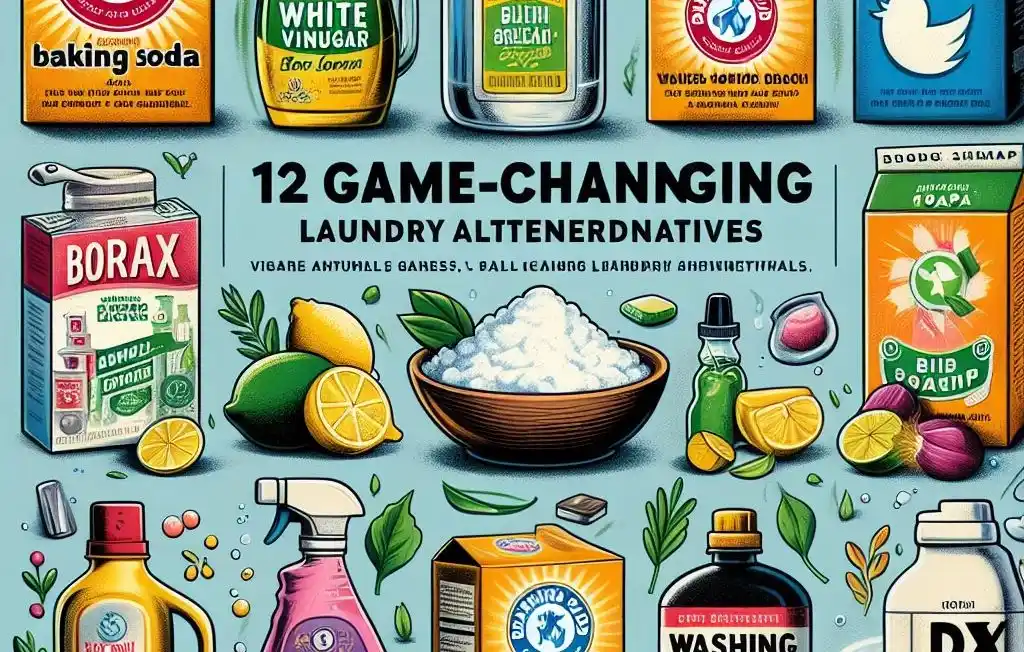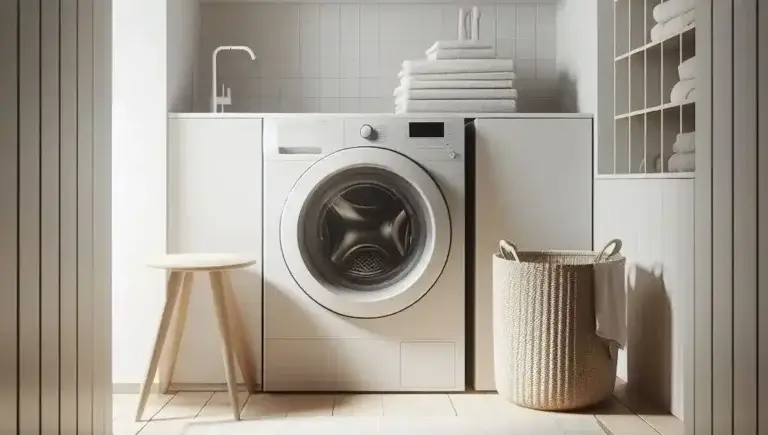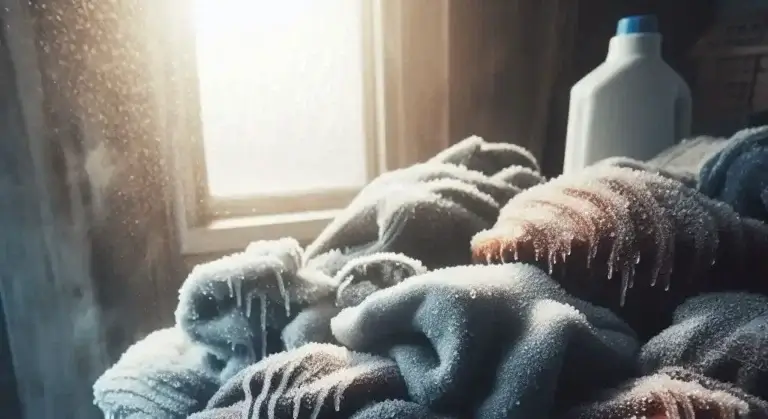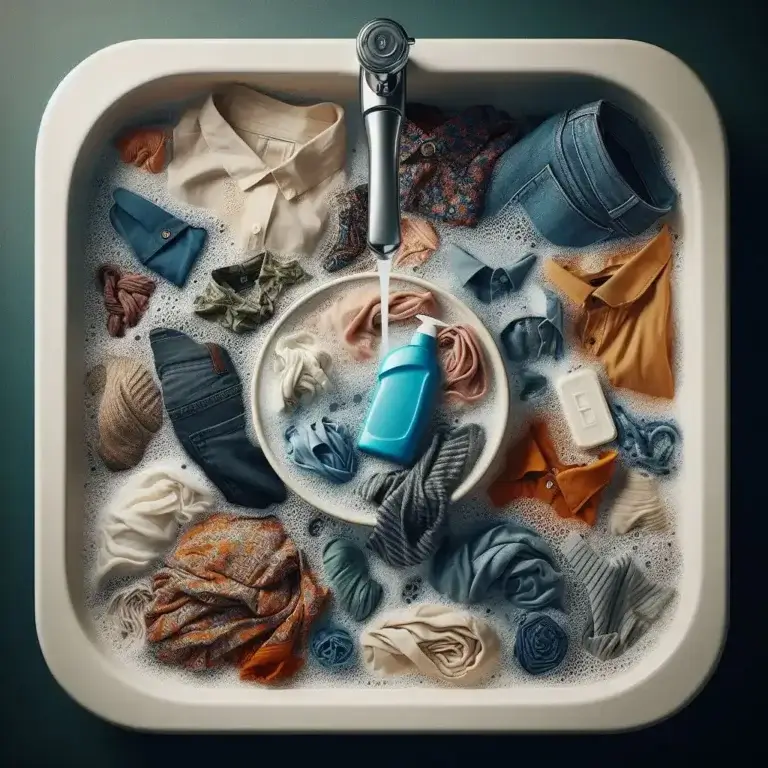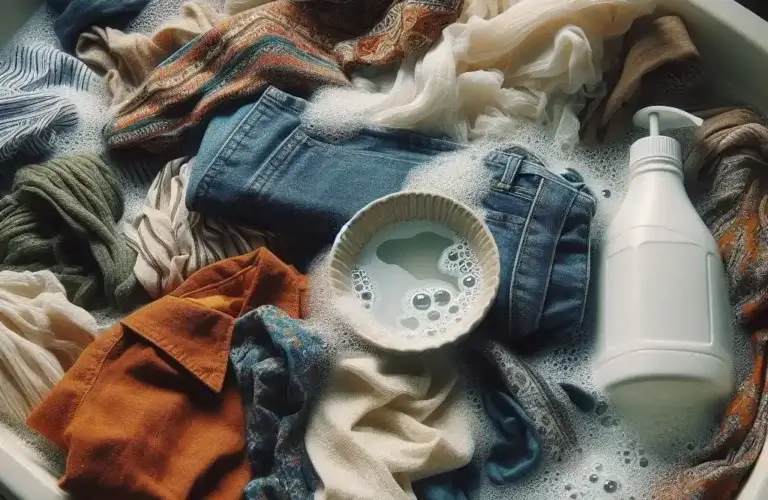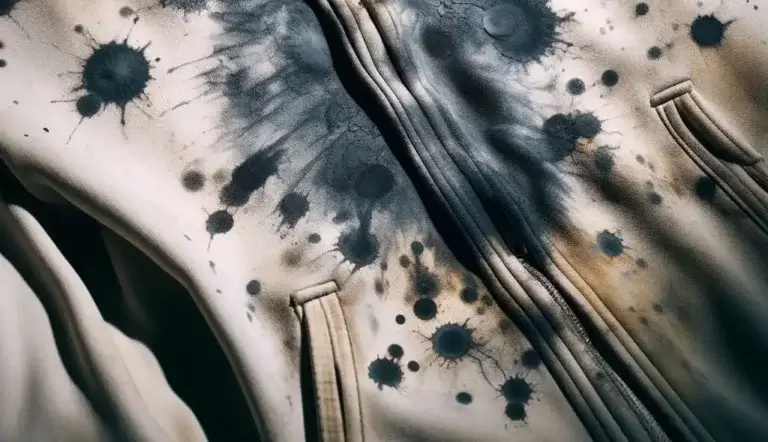What Can I Use Instead of Laundry Detergent? 12 Effective Detergent Substitutes When You Run Out
Have you ever found yourself standing in front of the washing machine with a pile of dirty clothes, only to realize you’re completely out of laundry detergent? It happens to all of us at some point. As frustrating as it is, you have more options than you might think for getting your clothes clean without detergent.
In this article, we’ll cover what can i use instead of laundry detergent and 12 effective substitutes you can use if you’ve run out of laundry detergent, including everyday household items like baking soda, vinegar, and soap. We’ll explain how well each substitute works, how much to use, and provide tips to get your best clean.
Whether you need an emergency solution just to tide you over until your next detergent run or want to switch to natural cleaning products, here are 12 options to use instead of laundry detergent.
Table of Contents
Why Use an Alternative to Laundry Detergent?
Before we dive into the alternatives, you might be wondering why you’d use a substitute instead of detergent in the first place. Here are some of the most common reasons:
- You’ve run out – The most obvious reason is you’ve used up the last of your store-bought detergent and need a quick solution to get through until you can buy more. All the options we cover in this article can help in a pinch.
- You want a natural option – Some people prefer to clean with natural ingredients instead of using harsh chemicals. Many of the substitutes here are non-toxic homemade solutions.
- You have sensitive skin – Those with skin sensitivities may find that commercial laundry products cause irritation or allergic reactions. Natural substitutes are often gentler.
- To save money – Some of these substitutes, like baking soda and vinegar, are very affordable alternatives to store-bought detergents. If you’re looking to cut costs on cleaning supplies, they make good budget-friendly options.
- To avoid chemicals – You might be concerned about some of the chemical ingredients contained in many name-brand detergents and want to limit your exposure. Several of the natural substitutes here are chemical and fragrance-free.
Now that you know why you might want to use a laundry detergent alternative, let’s explore what your options are.
12 Effective Substitutes You Can Use Instead of Laundry Detergent
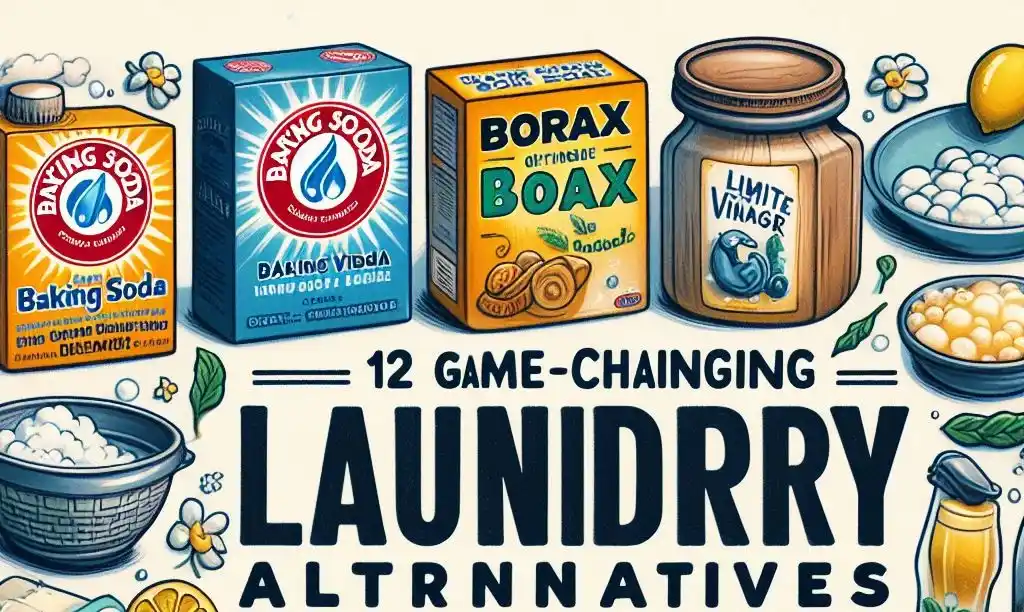
1. Baking Soda
One of the best substitutes for laundry detergent is basic baking soda. This versatile household staple can be used for all sorts of cleaning purposes, including as a DIY laundry detergent.
How well it works: Baking soda is a natural deodorizer and cleansing agent. It helps remove stains, odors, and residue from fabric. While it doesn’t produce suds like detergent, it still lifts dirt and cleans effectively.
How to use it: Add 1/2 cup of baking soda to your washing machine with each load of laundry. You can pour it straight into the drum before adding clothes. It combines well with other natural cleaning solutions like vinegar or lemon juice for extra cleaning power.
2. White Vinegar
Distilled white vinegar is another go-to ingredient that can act as a natural fabric softener and cleaning agent for laundry. The acidic vinegar helps kill bacteria and remove musty odors from clothes.
How well it works: Vinegar is a strong anti-bacterial that removes odors and brightens whites. It works with both front and top-loading machines. The main drawback is clothes might smell strongly of vinegar right after washing. But the scent fades as clothes dry.
How to use it: Add 1/2 to 1 cup of white vinegar to the detergent dispenser or directly into the drum. You can use it alone or with baking soda. The combo of vinegar and baking soda provides a chemical reaction that lifts stains and freshens laundry effectively.
3. Lemon Juice
Similar to vinegar, the citric acid in lemon juice cuts through grease and stains on clothing. It also helps brighten whites and can be used as a natural bleach alternative. Like vinegar, it disinfects and deodorizes laundry effectively.
How well it works: Pure lemon juice is an effective cleaning agent and deodorizer for laundry when used properly. Because it’s an acid, you do need to be careful about its effect on clothes over time, especially silk or wool items that could be damaged by the citric acid.
How to use it: Add about 1 cup of freshly squeezed lemon juice to your washing machine drum or detergent dispenser per average load. You can use lemon juice alone, but it combines especially well with baking soda to make clothes extra clean and fresh. The acidic lemon activates the soda for better stain removal.
4. Bar Soap
If you’ve run out of laundry detergent, look no further than a plain bar of soap. Any kind will do in a pinch, whether it’s bath soap, dish soap, or even shave soap. Grate it up, and soap can effectively wash away dirt, oils, and smelly residue from clothing.
How well it works: Grated soap dissolved in water works to break down oils and lift away dirt and bacteria. It may not clean quite as thoroughly as detergent on its own. But it can certainly tide you over for an emergency when you have no other choice.
How to use it: Grate about 4 ounces of soap using a cheese grater or vegetable peeler. Add the soap shreds directly into your washing machine drum before adding clothes and water. You want enough to still see suds in the water, so add a bit more if needed. Target extra-dirty spots by rubbing a bar of soap directly on stains first.
5. Borax
Borax is an all-natural mineral powder often used as an eco-friendly cleaning booster for laundry. It contains sodium tetraborate, which works to lift stains and help strip away residue. Borax softens hard water to enhance the cleaning effects.
How well it works: Borax is reasonably effective at cleaning clothes on its own or when combined with other natural solutions. It lifts stains, kills mold and bacteria, softens hard water mineral deposits so detergents work better, and deodorizes smelly clothes. The one downside is that it can leave a powdery residue if you use too much.
How to use it: Add about 1/2 cup borax to your washing machine with clothes, or even more for heavily soiled loads. You can also make a laundry booster solution ahead of time by dissolving 1 cup of borax with 1 gallon of hot water for a concentrated mix. Use about 1-2 cups per average load along with another cleaning base like baking soda or soap.
6. Oxygen Bleach
Oxygen bleach contains sodium percarbonate, an ingredient that acts as a color-safe bleach alternative for laundry. When dissolved in water, it releases hydrogen peroxide to lift stains and brighten whites. Oxygen bleach is gentler than chlorine bleach but still effectively removes discoloration.
How well it works: Oxygen bleach is quite effective at stain removal, brightening, and disinfecting laundry. It’s chlorine-free, so it won’t damage or fade colored clothing. The one limitation is that it works best in warm or hot water cycles. For best results, make sure your machine can reach these temperatures.
How to use it: Check the package instructions and add the recommended amount of oxygen bleach powder to your washing machine drum or detergent dispenser before adding clothes. You can add other boosters like baking soda too. Make sure to never mix oxygen bleach directly with vinegar, lemon juice, or other acids as this creates a toxic reaction.
7. Washing Soda
Also known as sodium carbonate, washing soda is a water softener and cleaning agent made from soda ash. It works well at removing oils, grease, stains, and heavy soils in laundry when used with other natural cleaners. Washing soda cuts through residue, softens hard water, and boosts the cleaning effects.
How well it works: Washing soda is caustic, so it can damage fabrics if you use too much. But when mixed properly with other substitutes, it lifts stains and residue without the harshness of bleach. It works especially well when paired with Borax to remove dingy build-up on white clothes.
How to use it: Add 1/4 to 1/2 cup washing soda per average load of laundry along with another cleaner like baking soda or borax. Make sure to never pour washing soda directly onto clothes, as it can cause discoloration. Mix it first with water before adding clothes.
8. Dish Soap
In a pinch, dish soap formulated for handwashing dishes can work to clean laundry too. The surfactants in dish soap lift grease and gently remove stains from fabric when added to wash water. Any basic liquid dish soap will work.
How well it works: Standard dish soap does a reasonably good job at gently cleaning delicate fabrics in small batches. The degreasing effects help remove body oils and food stains. It works best for hand-washed items or extra dirty spots pretreated before machine washing. The downside is it doesn’t effectively clean or disinfect large machine-washed loads.
How to use it: If washing delicates by hand, add a few squirts of dish soap to a sink or basin of warm water. For machine washing, rub dish soap directly onto stained areas of clothing for 5-10 mins before adding clothes to the wash to let it penetrate. Use care as too much dish soap may create overflowing suds.
9. Hair Shampoo
Hair shampoo is formulated to lift oil, dirt, and product residue from hair so it makes another solid pinch hitter for laundry detergent. It works similarly to dish soap at lifting body oils and stains from fabric. The one caveat is it can leave behind a slight floral or fruity scent.
How well it works: Shampoo contains surfactants that break down stubborn oil-based stains. It works best when used directly on stained clothes in hand-washed loads or tough marks in machine washing. It may not rinse away thoroughly and leave a fragrance, but shampoo can effectively clean in a detergent emergency.
How to use it: Rub a small dollop of shampoo directly onto grease-based stains on clothes 5-10 mins before washing. Then wash as usual in a machine or hand wash delicate items in a sink or tub with a little shampoo and water. Rinse thoroughly in clean water. Repeat rinse if needed to eliminate shampoo residue.
10. Body Wash
Very much like shampoo, body wash or liquid hand soap can lift away body oils and residue if you need an emergency laundry solution. These sudsing liquids already work to remove oils and bacteria from the skin so they translate well to treating tough stains on clothes too.
How well it works: Body wash isn’t an ideal full laundry solution but rather a targeted stain treatment for marks and skin secretions that have set into the fabric. Use it directly on the underarm or collar stains and anywhere body oils or lotion residue has set in before washing. It helps lift these stubborn residues when laundry detergent runs out.
How to use it: Squirt a small amount of body wash or liquid hand soap directly onto stained areas of clothing. Let it soak in 5 minutes before machine washing or hand washing delicate items. The surfactants and suds will penetrate and lift the oily marks. Adds extra to heavily soiled workout wear.
11. Laundry Booster Recipes
You’ve likely noticed by now that many of these DIY laundry substitutes like Borax, baking soda, vinegar or lemon juice work especially well when combined in your wash. Making up some homemade laundry booster mixes allows you to activate the stain-fighting benefits of these ingredients.
Having a batch of booster recipes pre-made saves time when you run low or out of detergent. Try these handy mixes:
- Baking Soda + Borax: Combine 2 cups each baking soda and Borax with enough hot water to dissolve. Add 1⁄2 cup booster per load.
- Baking Soda + Vinegar: Mix 2 tsp baking soda with 2 cups white vinegar. Add 1 cup booster solution per load with laundry to activate bubbles. Never pre-mix baking soda and vinegar solutions. Only add them separately with clothes to avoid chemical reactions.
- Borax + Washing Soda: Mix 2 cups borax with 2 cups washing soda and hot water to dissolve. Add 1⁄2 to 1 cup booster per load.
How well they work: Combining boosters provides extra cleaning power compared to using DIY solutions alone. For example, washing soda softens water so stains lift out while baking soda lifts the residue. Using solutions together gets clothes cleaner with natural ingredients.
12. Manufactured Eco Detergents
If you like the idea of switching to more eco-friendly laundry products but still want a ready-made detergent that’s convenient to use regularly, several natural brands offer effective options:
- Seventh Generation – Well-known for their plant-derived, hypoallergenic formula safe even for sensitive skin.
- Molly’s Suds – Specializes in detergents free from chemicals and synthetic ingredients but still tough on stains. Great for baby clothes.
- Ecos – Affordable, plant-powered detergent free from dyes with natural odor fighters. Leaves no chemical residue.
- Grab Green – 3-in-1 pods combine detergent, stain remover, and odor defense. Powder forms are also available.
- Mrs. Meyer’s Clean Day – Derived from plant-based essential oils. Biodegradable with light garden-fresh scents.
- Puracy – Uses plant-based enzymes for effective cleaning care that’s gentle for sensitive skin types.
- Attitude – Eco-friendly brand from Canada with formulated either plant-derived ingredients or mineral salts as cleaning agents.
Laundry Detergent Substitute FAQs
If you’re new to using DIY solutions and natural cleaners as alternatives to laundry detergent, chances are you still have some questions. Here are answers to some of the most frequently asked:
How Much Baking Soda or Vinegar Should I Use As Laundry Detergent?
As a general guideline, use about 1⁄2 cup each of baking soda and vinegar per average load. For larger or heavily soiled loads, add up to a cup. If mixing other boosters like Borax too, start with smaller 1⁄4 cup amounts and add more as needed.
Can I Use Just Baking Soda and Vinegar to Wash Clothes?
Yes, you can wash most everyday loads using only baking soda and vinegar as your detergent substitutes. Use them separately – add baking soda at the start of the wash cycle and vinegar during the rinse. The combination lifts stains, whitens, deodorizes, and disinfects reasonably well for basic laundry needs.
What is the Best Homemade Laundry Detergent Recipe?
Some of the best and easiest DIY detergent mixes are:
- Baking soda + Borax + Washing soda
- Baking soda + Vinegar
- Bar soap grated + Borax
- Lemon juice + Baking soda
Play around with different amounts of each to customize cleaning power and fabric safety for your needs. Consider making large batches of booster mixes to keep on hand.
What Should You Not Use as Laundry Detergent?
In a pinch, most basic soap and cleaning products will wash clothes reasonably well for at least a few loads. But there are a few ingredients you want to avoid using in laundry:
- Hydrogen peroxide – Can damage fabric fibers and lift color
- Rubbing alcohol – Very harsh and drying on fabric
- All-purpose cleaners – Often formulated with bleach or ammonia too harsh for laundry
- Drain cleaner – Extremely caustic on the skin and will damage clothes
Do not attempt shortcut laundry hacks suggesting these chemicals that can ruin clothing and washing machines.
Does Laundry Detergent Make a Difference?
Yes, laundry detergent makes a significant difference compared to just washing clothes in plain water. Good detergents cut through oil and grease, lift dirt from the fabric, remove stains, kill bacteria, prevent dingy build-up and residues on clothes, soften hard water mineral effects, and prevent scratchy clothes over time.
12 Tips for Getting the Best Results From DIY Laundry Solutions
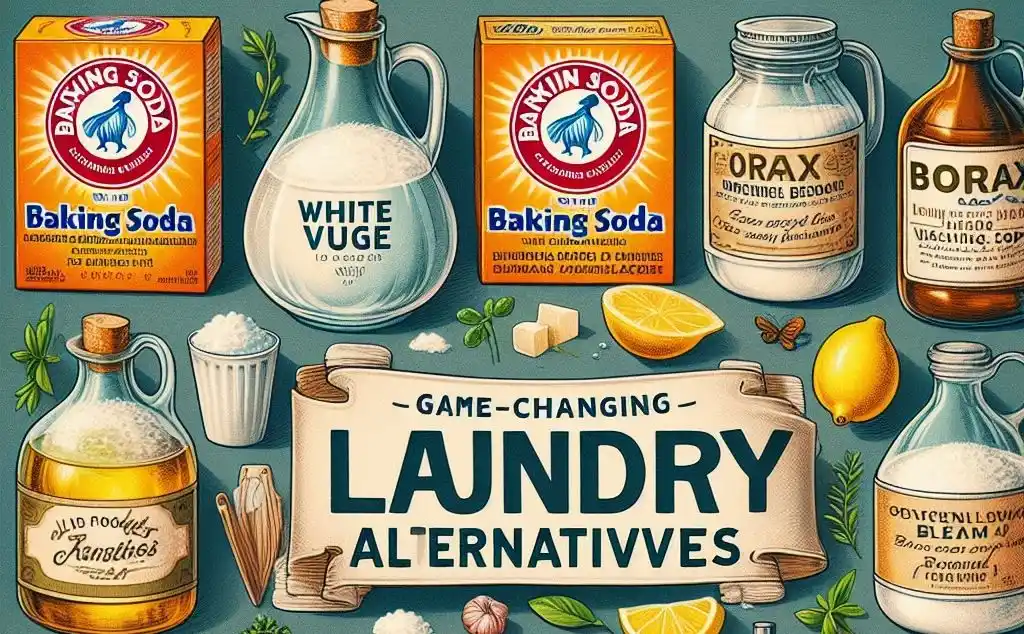
While homemade mixes make great natural substitutes when you’re out of laundry detergent, you may need to tweak your usual routine to get clothes truly clean. Here are 12 tips:
- Soak heavily stained clothes first – Letting them sit soaked for 30+ minutes gives DIY solutions time to penetrate stains.
- Use hot water – Heating water activates stain-fighting ingredients like oxygen bleach better than cold washes.
- Add vinegar or lemon juice to the rinse cycle – Helps remove any soap or booster residues.
- Increase wash time – An extra rinse cycle ensures clothes feel fresh, and residue-free.
- Use a laundry ball – These balls with internal ridges increase water friction to help lift stains without detergent.
- Limit load sizes – DIY cleaners need water circulation. Don’t overload the washing machine.
- Add laundry booster solutions directly to the drum first before adding clothes. Ensures even distribution of cleaning ingredients.
- Pre-treat stubborn stains – Rub DIY pastes of baking soda, lemon juice or grated soap directly on marks before washing.
- Increase recipe amounts for heavy soil – Use up to 1 cup of boosters like baking soda for very dirty clothes.
- Line or hang dry – Heat from dryers can bake stains or residue in place. Air drying avoids this.
- Shake out clothes after washing – Removes any lingering white powder residues from things like Borax.
- Use a laundry brush – Help DIY solutions penetrate by gently brushing over stained areas first.
The Takeaway – You Have Great Options Beyond Laundry Detergent
Hopefully, now you feel empowered the next time you discover an empty detergent bottle but still have dirty piles awaiting some TLC. While no homemade solution works quite as conveniently as commercial detergent, many of the elements you likely

